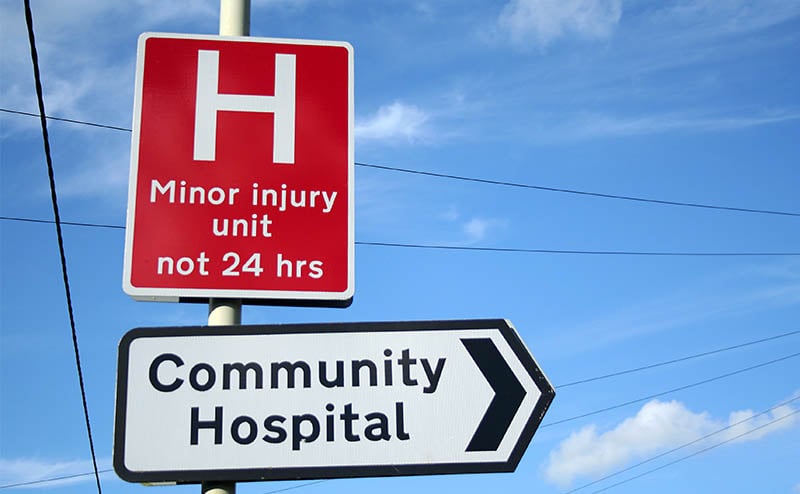A few weeks ago, ACEP submitted a comprehensive response to a proposed regulation issued by the Centers for Medicare & Medicaid Services (CMS) that establishes conditions of participation (CoPs) for Rural Emergency Hospitals (REHs). We also submitted a joint response to the reg with the American Academy of Family Physicians (AAFP) focusing in on the issue of scope of practice and the importance of having physician-led teams of health professionals provide the care that is delivered in REHs.
You may recall that the Consolidated Appropriations Act (enacted on December 27, 2020) included a provision that would allow critical access hospitals (CAHs) and small rural hospitals (those with less than 50 beds) to convert to REHs starting on January 1, 2023. REHs, once established, will receive enhanced reimbursement under Medicare. They will not provide any inpatient services but must be able to provide emergency services 24 hours a day, 7 days a week. The goal of this new facility-type is to help struggling rural hospitals stay afloat by allowing them to shed their inpatient beds and continue to operate with lower administrative costs. Thus, instead of closing, these facilities could continue to serve their communities and provide access to emergency care and other outpatient services.
I previously summarized the key provisions of the REH CoP proposed reg in the July 7th Regs and Eggs blog post. One of the major CoPs in the reg that ACEP responded to relates to staffing requirements for REHs. The Consolidated Appropriations Act does not specify the specific type of physician and/or practitioner that must provide services within an REH, so CMS decided to grant REHs a great deal of flexibility to determine how to staff the emergency department at the REH 24 hours a day, 7 days a week. CMS does not believe that it is necessary that a doctor of medicine or osteopathy, nurse practitioner, clinical nurse specialist, or physician assistant be available to furnish patient care services at all times in the REH. Instead, CMS proposed that a physician or practitioner with training or experience in emergency care be on call and immediately available by telephone or radio contact and available on site within specified timeframes.
In ACEP’s response (and in our joint response with the AAFP), we state upfront that physicians should supervise all care delivered by non-physician practitioners in REHs. When possible, board-certified emergency physicians should conduct that supervision, but we understand that, due to workforce issues, that is not always possible. When a board-certified emergency physician is not available, it is still critical that physicians experienced and/or trained in emergency medicine (such as family physicians) oversee care being delivered by non-physician practitioners in REHs. Emergency patients represent some of the most complex and critically ill patients in medicine, and effective management of these patients requires years of specialized training.
We also strongly oppose the proposal to not require a doctor of medicine or osteopathy, nurse practitioner, clinical nurse specialist, or physician assistant to be physically present at REHs at all times. We believe that that if finalized, such a policy would pose significant patient safety concerns. It could also increase the chances that REHs violate the Emergency Medical Treatment and Labor Act (EMTALA) if a trained clinician is unable to arrive in time to perform a medical screening examination and stabilize the patient if the patient has an emergency medical condition. It is imperative that any time a patient comes to an REH with an immediate medical emergency, there will be clinician onsite to treat them IMMEDIATELY.
Another related policy in the reg related to the establishment of medical directors. CMS states that it is NOT proposing to require board-certified emergency physicians to serve as medical directors of the REH—against ACEP’s previous recommendation. CMS agrees “that having a board-certified emergency physician serving as the medical director of the REH would benefit patients by ensuring that the REH is overseen by a highly qualified physician with a high level of expertise in emergency medicine” but believes “that requiring this of REHs would be unduly burdensome due to the challenges faced by rural communities in obtaining and retaining medical professionals to provide health care services.” CMS does “encourage REHs to have such a physician serve in the capacity of medical director if possible.” In ACEP’s response, we state that we appreciate that CMS understands the value of having board-certified emergency physicians serve as medical directors. However, we still strongly believe that, whenever possible, board-certified emergency physicians should serve in this role. When no board-certified emergency physicians are available, a physician with experience in emergency medicine, including family medicine trained physicians, should serve as medical director. Therefore, ACEP requests that CMS make it a requirement that a physician with experience in emergency medicine serve as the medical director of a REH.
Other areas of the reg that we respond to include:
- Telemedicine: CMS recognizes the “important role that telemedicine can play in the provision of care in rural communities” and is proposing a more flexible telemedicine and privileging process. Overall, ACEP supports CMS’ approach, as we appreciate CMS’ efforts to reduce regulatory and administrative barriers to telehealth. ACEP believes that telehealth can serve as a method for physicians to deliver services or oversee care provided by non-physician practitioners in REHs when in-person care and/or supervision is not possible. However, we caution CMS to ensure that the staffing standards of the distant-site telemedicine entity are equivalent to that of the REH—including a board-certified emergency physician or other physician with significant training and/or experience in emergency medicine.
- Additional Outpatient Medical and Health Services: CMS is proposing that REHs be allowed to provide additional medical and health outpatient services that include, but are not limited to, radiology, laboratory, outpatient rehabilitation, surgical, maternal health, and behavioral health services. With respect to maternal health services, ACEP believes, at a minimum, a CoP for REHs should require emergency clinicians to be able to recognize and initiate treatment of preeclampsia, miscarriage, and postpartum depression, as well as precipitous deliveries and common delivery complications such as shoulder dystocia and postpartum hemorrhage. In addition, ACEP believes that it will be important for REHs to provide certain behavior health services, including having the ability to initiate medication assisted treatment (MAT) for the treatment of opioid use disorder.
- Quality assessment and performance improvement program (QAPI program): CMS is proposing to require that every REH develop, implement, and maintain an effective, ongoing, REH-wide, data-driven QAPI program. ACEP strongly believes that there is a need to improve the quality of care delivered in rural areas. Research suggests that patients being treated in rural EDs may overall have less acute conditions but experience worse outcomes when compared to patients receiving care in urban EDs. However, a potential barrier to quality reporting that REHs may encounter is having access to the data they need to improve their quality performance and having the staff available to analyze the data. Thus, CMS should consider contributing additional resources to REHs to specifically help them with their quality reporting and data analytic capabilities.
- Emergency Preparedness: CMS is proposing emergency preparedness requirements that align with the existing emergency preparedness standards for Medicare and Medicaid providers. In general, ACEP supports CMS’ proposals. Having a comprehensive plan in place and training all staff about their responsibilities during an emergency is essential. With respect to training and testing requirements, ACEP strongly prefers comprehensive “boots on the ground” drills, as these are more effective than tabletop exercises or workshops.
So, those are the main points we make in our response. Before concluding, I want to remind you that other aspects of REHs, such as the quality reporting requirements and payment policies, are being fleshed out in the Calendar Year (CY) 2022 Outpatient Prospective Payment System (OPPS) proposed reg—to which ACEP is currently in the process of responding. Both the final CoPs and final quality and payment policies will be included in the CY 2022 OPPS final reg, which will be released by November 1, 2022.
It will be interesting to see whether any critical access hospitals or small rural hospitals will actually convert to REHs, and if so, whether any will do so in 2023 when the REH provisions go into effect. According to a recent article from Kaiser Health News, some hospital administrators are skeptical that many hospitals will transition to REHs in the short term. Once the regulatory policies are finalized, many states will need to pass laws to certify or license the new facilities. Further, because of the COVID-19 pandemic, some communities may be less receptive to eliminating inpatient beds in small hospitals.
Thus, the operative question is: will this new facility-type gain any traction? Well, we will just have to wait a few more months (or longer) to find out!
Until next week, this is Jeffrey saying, enjoy reading regs with your eggs.






